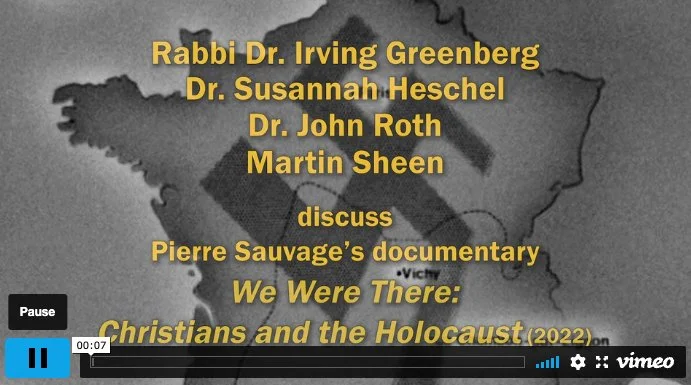WE WERE THERE:
CHRISTIANS AND THE HOLOCAUST
In We Were There: Christians and the Holocaust (57 min., 2026), veteran documentary filmmaker Pierre Sauvage (Weapons of the Spirit) pursues his exploration of Christian rescue during the Holocaust—and of the Christian share of responsibility for the crime.
Also available below is a panel discussion of the film with Rabbi Irving (Yitz) Greenberg, Dr. Susannah Heschel, Dr. John K. Roth, Martin Sheen, and Pierre Sauvage.
Over thirty years in the making, We Were There: Christians and the Holocaust notably provides the eloquent testimony of four French rescuers of Jews during the Holocaust. Originally filmed in 1982 by Sauvage for Weapons of the Spirit but not included in that 1989-2026 documentary, Sauvage at last edited together these interviews over thirty years later, also weaving in vivid evocations of the French internment camps.
Featured in these sections of the film are legendary human-rights activist Madeleine Barot, founder of the French organization the Cimade; Pastor André Dumas, once a relief worker in the Cimade; and Jean-Marie Soutou, who was active in the forceful French Témoignage Chrétien (Christian Witness) movement; and Magda Trocmé, who, speaking here in English, offers up the equally direct and articulate testimony of the extraordinary widow of pastor André Trocmé, pastor of Le Chambon-sur-Lignon, France during World War II and the Holocaust.
In and around that village in Nazi-occupied France, 5,000 Jews were sheltered—by 5,000 Christians, as recounted in Weapons of the Spirit. That film will also soon be re-released in a remastered 2026 edition.
These committed Christians—a Catholic and three Protestants, all honored by Israel as righteous gentiles—embody and explain Christian rescue during the Holocaust.
But their testimony is given additional resonance by being intercut with the challenging views of the late Rev. Dr. Franklin Littell.
Dr. Littell forcefully argues that the Holocaust was and is a crisis for Christians as well as for Jews. In vivid language that never pulls its punches, the plain-spoken clergyman, author, and educator underscores the failures of education then as well as the failures of Christianity. Above all, he asks whether we are effectively striving today to learn the lessons of those terrible times.
Panel discussion of the film with Rabbi Irving (Yitz) Greenberg, Dr. Susannah Heschel, Dr. John K. Roth, Martin Sheen, and Pierre Sauvage.
The video will play above after you enter your email and name. This information will not be shared with anyone, and you will receive few emails from us.
COMMENTS:
Dr. Michael D. Bess, Chancellor’s Professor of History, Vanderbilt University—about an earlier draft of this film:
"This magnificent film sheds new light on the moral choices faced by those who lived through the Holocaust, and challenges the viewer to examine the subtler and more troubling implications of those choices for those of us living in the world of today.
It is a moving and inspiring portrait of individuals who found the inner strength to resist the pressures and fears of a Nazi-occupied Europe, and to find pathways toward meaningful and boldly righteous action. The various elements in the film produce a synergy in which the whole is greater than the sum of the parts, provoking a profound impression on the viewer, directly linking the horrors of the past with the pressing moral challenges of the present day.
A masterful work of cinema, and more importantly, a powerful vehicle for exploring the limits of moral thought and action."
